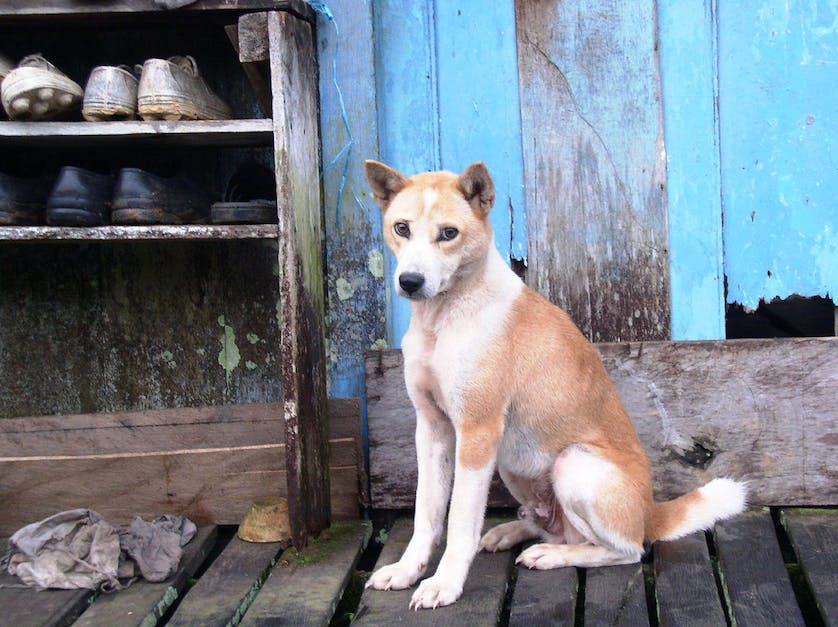
From January 4th to 7th 2019, people will be flying in to Chiang Mai from various parts of world to take part in this year’s “Food for Footsteps” trek through the Wiang Haeng district and Chiang Dao national park. This year, the 11th year of the trek, the organization is hoping to get a few local expatriates and locals on board. Each year the route is the same, which in total covers 65km over four days far from the beaten path. Lodgings are with Karen and Lisu hilltribes and the group is led by Hod Eco Trek. If you sign-up for the next trek, you can be assured that your efforts are, as the saying goes, all for a good cause.
This year Food for Footsteps will be teaming up with Chiang Mai’s D-Foundation, and all the money raised from this trek will be going to what used to be called ‘Care for Dogs’, now named ‘WVS-Thailand or WVS-Care for Dogs (WVS is Worldwide Veterinary Service). That means all the cash raised will be going to Chiang Mai’s homeless pooches that have found themselves in need of being rescued. Previously, Food for Footsteps and its British founder Matthew Rickard, has raised anywhere from 25-35,000 USD a year mainly supporting children from marginalized communities in Thailand, not canines in crisis. The concept is simple: If you go on the hike, try and raise some cash, which isn’t as hard as you think as there are various platforms you can use to do that and it doesn’t take long to set it up. Before we get to that, let’s talk a bit about WVS-Thailand and how the English-based organization ended up here in Chiang Mai with Care for Dogs.
The Dogs
Rickard and D-Foundation spent an afternoon at WVS-Thailand in September with Ian Clarke, a former student of canine behavior who worked for several years with animals’ charities in the UK. Clarke is presently director of operations at WVS-Care for Dogs. He first explained the reason why the main compound is so empty and surprisingly quiet these days. That’s mainly because the organization now houses many of its dogs on a nearby large tract of land. If you’re familiar with the place and former frenetic feel of the main enclosure, it’s now more in line with a canine Zen monastery. If you’re not familiar with Care for Dogs, here’s the story.
The founder of Care for Dogs, German expatriate Karin Hawelka, around 13 years ago found a triumvirate of dogs that had been left outside her house in the Mae Hai district of Chiang Mai. She took in the dogs, had them sterilized, fed them, vaccinated them, and that was that…for a short time. The threesome she took in became a nascent non-profit. Hawelka realized that Chiang Mai was somewhat overwhelmed by street dogs, not all of which were treated with loving care. She began to take in more dogs, and also began sterilizing dogs to keep the population down. Some were taken from the streets after suffering injuries or disease, and in time a surgery with local veterinary surgeons was home to full-time workers. Fast-forward a few years and Care for Dogs main compound was bustling, although perhaps over-flowing at times much like a yard in San Quentin Prison. Care for Dogs was supported by donors, and raised money through activities and events. The onus was always on sterilization and vaccination, but also treating injured dogs and trying to get them back into communities where possible – or hoping that someone might adopt a dog. The dogs are not taken off the streets for no reason, the ones at the shelter are mostly dogs that needed medical care or were in dangerous situations. For instance, one of the dogs we saw on our visit was recovering from an awful wound that was the result of an angry food seller near Chiang Mai University throwing hot oil over it. In Chiang Mai many ‘community dogs’ don’t have owners, but they are fed by the community. The said community doesn’t go as far as to getting them vaccinated or looked after when they are injured or sick. Care for Dogs became a sanctuary of sorts for dogs that found themselves cursed by the vagaries of street life.

The People
Clarke explained that WVS-Thailand sterilizes around 5,000 dogs a year both at the shelter and through doing outreach work in communities all over Northern Thailand. The impact of not doing this means overpopulation, and that’s not good for the community or the dogs. “The ethos of WVS,” said Clarke, “is to control the animal birth rate.” If that is not successful, he said, “We are always going to be fixing dogs.”
Dogs are regularly brought in, some literally on their last legs (sometimes last three-legs), and it takes surgeons working full-time to get them on the mend. In all there are thirty-two Thai staff and around 120 dogs. The former needs to be paid and the latter taken care of. All this costs up to a million baht a month, which just about can be paid for through donations and fund-raising as well as money from WVS-UK. But much more needs to be done and the coffers are empty each month.
“More than anything we’re looking to refurbish some of the areas within the enclosures,” said Clarke, explaining that parts of the shelter have lasted a decade, but things are starting to fall apart. The old wooden dog boxes are crumbling, while wood makes a good home for a dog’s worst enemy – fleas and ticks. With enough money Clarke wants to re-build the shelter with molded plastic, which is also much easier to clean and will last. The fence at the back of the enclosure sunk into the ground this year due to heavy rains, and that has to be replaced. WVS is in the process of trying to tile many areas, making them easier to clean and prevent the spread of diseases. If the place takes less time to clean, staff can more time to spend with dogs. At the moment much of the time is just spent cleaning up after them.
“We have to look at our food,” Clarke went on, saying that if the food was of a higher quality the dogs would have fewer health issues. That’s just not affordable right now. “The food that we’re giving them now, it’s not the cheapest on the market, but it’s certainly not the highest quality.” He called their grub in nutritional terms the, “equivalent of our McDonalds.” With better food, he says, there will be fewer skin issues, temperament issues, hair loss, and the general health and well-being of the dogs would improve. The good news, the money raised from the trek could be enough to keep the dogs in healthy food, at least if the donation was spent on food alone. It will also go a good way to giving them a better home.
If people aren’t in a position to donate money or even come on next year’s trek, the one thing they can do is adopt a puppy, a youngster, middle aged dog, or an ageing mutt. The latter dogs are harder to adopt, but Clarke said if you can find it in your heart, older dogs can be less work, seeing that they are house-ready and won’t be tearing apart the contents of the family shoe cupboard. People might also just get in touch with the center and help with things such as dog walking, which is not technically volunteering so a work permit is not needed. “Adopting a dog is the single biggest thing anyone can do to help; it’s the number one thing they can do if they’ve got room in their home and their heart to take one of these dogs. They are going to change the life of that dog forever and they are going to improve their own quality of life.” So, if you are in need of a dog to bark outside your garden gate at intruders, one to sit on your lap or one to go madly chasing after sticks, there is a dog in the shelter that will suit your needs.
The Trek
Australian Ed Bradbury has done the trek four times. “The journey itself was a breathtaking one, varied, challenging and thoroughly enjoyable every step of the way. It was a wonderful mix of people from all corners of the earth coming together for a common cause,” said Bradbury. “Great friends were made, many laughs were had, limits were challenged, and a real sense of team carried us through some of the most awe-inspiring parts of Thailand that the average person will never see. We encountered the Thai people in their element and were touched by some incredible people we met at the villages we visited in the thick of the jungle, shared food, camp fires and home brew with them.”
Rickard started this more than 12 years ago, raising money for an orphanage in Khao Lak for kids whose parents had died in the 2006 Asian tsunami. Rickard, who has worked in the UK, Australia, Singapore and Thailand, presently lives in Chiang Mai. During 2006’s Cyclone Nargis he was in Myanmar on a relief mission to help those affected. He’s also a big dog lover and this year he decided he wanted to raise money for dogs in need. “In 2015 a dog actually joined the trekking group and followed us for three days even when we tried to take him,” said Rickard. In the end it was discovered the dog was indeed homeless and Rickard took him home and called him Hobo. “Having lived in Chaing Mai for two years with two dogs that are my best mates, it felt it was time to change the direction of fund-raising and do something for a local charity that is helping the canine community.”
You
If you want to get on next years trek and are in Thailand the cost for four days hiking, food and drinks, a dinner in Chiang Mai and all accommodation during the trek will be $300.
But there is a catch. That catch is that to take part on the trek you are expected to raise some money, 100 percent (minus a small portion from the fundraising website) of which goes towards helping the dogs at WVS-Thailand. That can easily be done by setting up a donation page on www.justgiving.com under ‘Worldwide Veterinary Service’. The team at Footsteps for Good can help you set a page and all you have to do is share that page with your friends and watch the money roll-in.
Here’s an example of a Just Giving page setup by a Thai national living in the UK. She’ll be joining the next trek:
https://www.justgiving.com/fundraising/wowe-beaumont
If you want to know more about the trek or sign-up, contact: jamesaustinfarrell19@gmail.com
If you want to help out at VWS-Thailand, want to adopt a dog, or just visit the shelter contact: contact@carefordogs.org
